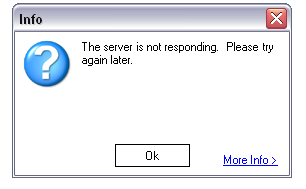-

Are your contacts not responding?
What to do if you don’t hear back…
Let’s say that you’ve been reaching out to people for informational interviews and you don’t hear back as often as you’d like. What should you do? As any good salesperson will tell you, there’s a fine line between being persistent and being a pest. But reaching the limit of persistence without stepping into “pest” territory is a challenge. If you don’t often hear back from your contacts when you reach out, ask yourself the following questions:
- Does my message call for a response? Often times international students expect to get a response to a thank you note (or some other dead end correspondence). I was giving a presentation at the Fox School at Temple University a while back, and my host Jill Valeant – who also used to work in campus recruiting – put it very succinctly to her students: “you’re not going to get a thank you to a thank you.” So true!
- Are you giving more often than you are asking? International students sometimes have a tough time thinking of ways to give, and instead use requests as a reason for contacting someone. Contacts quickly tire of frequent requests for favors. Cut down on the requests, and you’ll find that you’ll hear back more often. If you need ideas, check out this blog on ways to follow up.
- Is the follow up appropriate to the stage of the relationship? For example,did your first meeting go well, or did you get the sense that your contact wasn’t really interested in keeping in touch with you. You’re not always going to connect well with your contact. That’s not a problem. But if you don’t hear back from a contact, it may be a sign that you should invest time connecting with other people.
Assuming you’ve ensured that your outreach and expectations are appropriate, and you still haven’t heard back, you might consider sending a gentle reminder to your contact. Here are two prompting techniques that I like to use:
- If emailing… Forward your original email back to the person with one line of text that says “Did you have any thoughts on the message below? I’m quite interested in hearing from you, but I don’t want to be a pest.” This is direct, but courteous. Many contacts will be curious what “the message below” is and take a look.
- If calling… Leave a message for the person saying that you will call back, but if they have a chance in the meantime, they can reach you at… [your phone number]. This suggests to the person that they will be hearing from you again (there’s no avoiding it!), and that they may as well call you back. This technique also gives you permission to call the person back whenever you want. If you had left a message and asked for a call back without suggesting that you would follow up, you would give control of the correspondence to your contact. It would then be up to them to decide when (or if) to call you back.
Do these techniques work all of the time? Certainly not! But I have found them helpful when I don’t hear back.



What do you think?
Comment Cancel